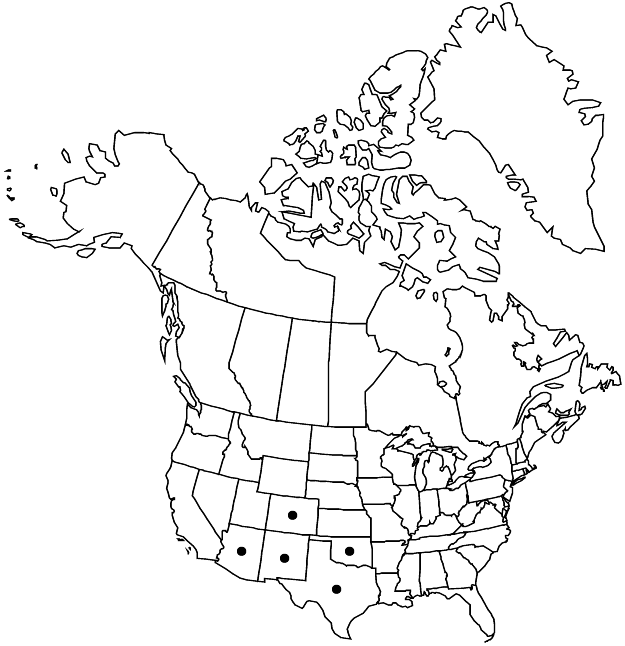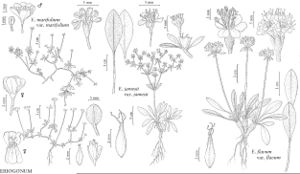Difference between revisions of "Eriogonum jamesii var. jamesii"
FNA>Volume Importer |
imported>Volume Importer |
||
| (5 intermediate revisions by one other user not shown) | |||
| Line 1: | Line 1: | ||
{{Treatment/ID | {{Treatment/ID | ||
|accepted_name=Eriogonum jamesii var. jamesii | |accepted_name=Eriogonum jamesii var. jamesii | ||
| − | |accepted_authority= | + | |accepted_authority= |
|publications= | |publications= | ||
|common_names=James’s antelope sage | |common_names=James’s antelope sage | ||
| Line 20: | Line 20: | ||
|elevation=(1000-)1300-2900(-3100) m | |elevation=(1000-)1300-2900(-3100) m | ||
|distribution=Ariz.;Colo.;N.Mex.;Okla.;Tex. | |distribution=Ariz.;Colo.;N.Mex.;Okla.;Tex. | ||
| − | |discussion=<p>Variety jamesii is widespread, and although generally scattered and infrequent, can be locally common in places. It occurs from southern Colorado south into eastern Arizona, New Mexico, western Oklahoma, and northern and western Texas. It merges with var. undulatum in southeastern Arizona, southern New Mexico, and especially western Texas.</p> | + | |discussion=<p>Variety jamesii is widespread, and although generally scattered and infrequent, can be locally common in places. It occurs from southern Colorado south into eastern Arizona, New Mexico, western Oklahoma, and northern and western Texas. It merges with <i></i>var.<i> undulatum</i> in southeastern Arizona, southern New Mexico, and especially western Texas.</p> |
|tables= | |tables= | ||
|references= | |references= | ||
| Line 29: | Line 29: | ||
-->{{#Taxon: | -->{{#Taxon: | ||
name=Eriogonum jamesii var. jamesii | name=Eriogonum jamesii var. jamesii | ||
| − | + | |authority= | |
| − | |authority= | ||
|rank=variety | |rank=variety | ||
|parent rank=species | |parent rank=species | ||
| Line 44: | Line 43: | ||
|publication year= | |publication year= | ||
|special status= | |special status= | ||
| − | |source xml=https:// | + | |source xml=https://bitbucket.org/aafc-mbb/fna-data-curation/src/2e0870ddd59836b60bcf96646a41e87ea5a5943a/coarse_grained_fna_xml/V5/V5_754.xml |
|subfamily=Polygonaceae subfam. Eriogonoideae | |subfamily=Polygonaceae subfam. Eriogonoideae | ||
|genus=Eriogonum | |genus=Eriogonum | ||
Latest revision as of 22:13, 5 November 2020
Herbs, spreading, loose mats, 3–8 dm wide. Aerial flowering stems tomentose to floccose. Leaf blades 1–3 × 0.5–1 cm, densely whitish- to grayish-tomentose abaxially, less so to thinly tomentose and greenish adaxially, margins plane. Inflorescences compound-umbellate, branched 2–5 times; bracts usually semileaflike, those of proximal node 0.5–2 × 0.3–1 cm. Involucres 4–7 × 2–5 mm. Flowers 4–8 mm. 2n = 40.
Phenology: Flowering Jun–Oct.
Habitat: Sandy to gravelly or infrequently rocky flats and slopes, mixed grassland, saltbush, blackbrush, creosote bush, mesquite, and sagebrush communities, oak, pinyon and/or juniper, and montane conifer woodlands
Elevation: (1000-)1300-2900(-3100) m
Distribution

Ariz., Colo., N.Mex., Okla., Tex.
Discussion
Variety jamesii is widespread, and although generally scattered and infrequent, can be locally common in places. It occurs from southern Colorado south into eastern Arizona, New Mexico, western Oklahoma, and northern and western Texas. It merges with var. undulatum in southeastern Arizona, southern New Mexico, and especially western Texas.
Selected References
None.
